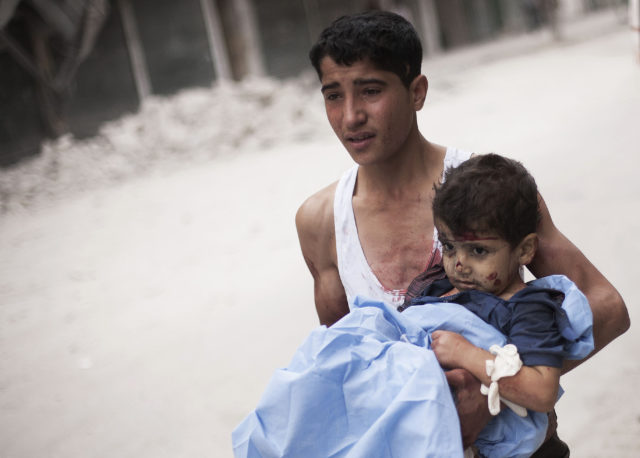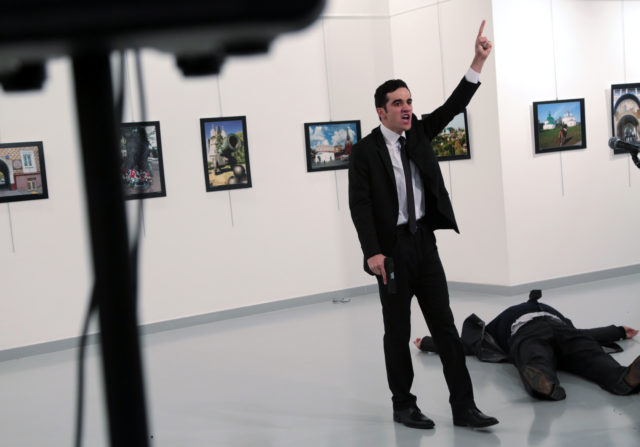By Barbara Slavin
Students of the Middle East learn quickly that in that chronically unstable part of the world, things can always get worse and frequently do.
This Christmas season, as millions around the world celebrate the birth of Jesus Christ, the prospects for peace on earth in the region of his birth are non-existent and the mayhem is spreading.
After suffering agonizing bombardment for weeks, rebel-held eastern Aleppo has surrendered to the forces of Syria, Russia and Iran. Buses are transporting survivors to Idlib province, southwest of what was Syria’s most populous city and a center of civilization for millennia. Now it is a charnel house.

A Syrian young man holds a child wounded by Syrian Army shelling near Dar El Shifa hospital in Aleppo, Syria, Thursday, Oct. 11, 2012. (AP)
Thousands have died in Aleppo, adding to a toll of half a million killed since Syrians rose against the regime of Bashar al-Assad nearly six years ago. Their plight – dramatized by pictures of ghostly, dust-coated children pulled from the rubble of bombed buildings — has stirred intermittent outrage and hashtag sympathy but no countervailing military intervention.
At his final news conference of the year, President Barack Obama decried what he called “a deliberate strategy of surrounding, besieging and starving innocent civilians…. relentless targeting of humanitarian workers and medical personnel, entire neighborhoods reduced to rubble and dust [and] continuing reports of civilians being executed. These are all horrific violations of international law.”
But the president made clear that he planned no U.S. military solution to end or avenge the agony. Obama asserted that “unless we were all in and willing to take over Syria” with U.S. troops, nothing meaningful militarily could be done.
While Americans are weary of seemingly endless wars in Afghanistan and Iraq, the Obama administration could have done more to help the people of Syria.
Ryan Crocker, a distinguished former U.S. ambassador to Syria, Iraq, Lebanon, Pakistan, Afghanistan and Kuwait, told this analyst that he was mortified by a policy that has largely featured endless conversations between Secretary of State John Kerry and Russian Foreign Minister Sergei Lavrov.
“We’ve gone from appeasement to complicity” in Russian war crimes, Crocker said.
Obama erred early on in the Syrian war by asserting that “Assad must go” without putting in place a strategy to remove him. He compounded this by announcing a “red line” against the Syrian use of chemical weapons in 2012, threatening military force and then failing to follow through a year later after Assad killed hundreds in a nerve gas attack on a suburb of Damascus.
Obama has rebuffed frequent suggestions to set up any kind of safe zone that would allow displaced Syrians to remain in their country instead of escaping to neighboring countries and to Europe, with destabilizing effect. While the United States has increased its quota for Syrian refugees, the numbers admitted are still miniscule and likely to decrease if not stop altogether under an Islamophobic Trump administration.

A man identified as Mevlut Mert Altintas shouts after shooting Andrei Karlov, the Russian Ambassador to Turkey, at a photo gallery in Ankara, Turkey, Dec. 19, 2016. Shouting “Don’t forget Aleppo! Don’t forget Syria!” Altintas fatally shot Karlov in front of stunned onlookers at a photo exhibit. (AP)
Meanwhile, the negative impact of Syria on the region and the wider world cannot be underestimated.
Andrey Karlov, the Russian ambassador to Turkey, is among the latest victims. A Turkish policeman who gained access to a museum the ambassador was visiting shot Karlov to death on Monday. According to witnesses, the assassin screamed, “Don’t forget Halep [Aleppo]! Don’t forget Syria!”
Turkey has played a dubious role in the Syria conflict, supporting sketchy rebel groups and allowing thousands of foreign fighters into Syria to join the Islamic State (ISIS) and other extremist organizations. Facing an economic crisis caused in part by these policies, growing authoritarianism and a return to war against indigenous Kurds, the regime of President Recep Tayyip Erdogan had patched up relations with Russia, a key Assad ally. The murder of Karlov will raise new questions about Turkey’s ability to guarantee security in a country that, as Westerners have fled, increasingly relies on Russian tourism and trade.
Ignoring Aleppo and other regime targets, a U.S.-led coalition is making slow progress expunging ISIS from remaining strongholds in Syria and Iraq. But internally displaced and refugee Sunni Muslims from a number of countries remain a source of concern regionally and in Europe and sympathizers like the gunman in Turkey are likely to proliferate. A horrific attack Monday on a Christmas market in Berlin bore the hallmark of ISIS-inspired terrorism; the prime suspect in this case is a refugee from Pakistan.
Unsolved conflicts in the region — involving Palestinians, Kurds, Afghans, Pakistanis, Iraqis and Syrians – have historically exported violence to other parts of the world. Combined with the dispiriting politics of the United States this year, current events recall the poem by William Butler Yeats entitled, “The Second Coming.”
Turning and turning in the widening gyre
The falcon cannot hear the falconer;
Things fall apart; the center cannot hold;
Mere anarchy is loosed upon the world,
The blood-dimmed tide is loosed, and everywhere
The ceremony of innocence is drowned;
The best lack all conviction, while the worst
Are full of passionate intensity.
Surely some revelation is at hand;
Surely the Second Coming is at hand.
The Second Coming! Hardly are those words out
When a vast image out of Spiritus Mundi
Troubles my sight: somewhere in sands of the desert
A shape with lion body and the head of a man,
A gaze blank and pitiless as the sun,
Is moving its slow thighs, while all about it
Reel shadows of the indignant desert birds.
The darkness drops again; but now I know
That twenty centuries of stony sleep
Were vexed to nightmare by a rocking cradle,
And what rough beast, its hour come round at last,
Slouches towards Bethlehem to be born?
Barbara Slavin is Acting Director of the Future of Iran Initiative at the Atlantic Council in Washington. Follow her on Twitter @barbaraslavin1.

